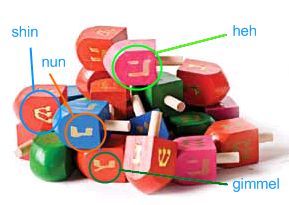







Well,you actually may already know this, since it was noted in previous issues of The Messianic Times. The first mention of Hanukkah—Feast of Dedication—appears in John 10:22:
Then came the Feast of Dedication [Hanukkah] at Jerusalem. It was winter, and Yeshua was in the temple area walking in Solomon’s Colonnade. The Jews gathered around him, saying, “How long will you keep us in suspense? If you are the Messiah, tell us plainly.” Yeshua answered, “I did tell you, but you do not believe. The miracles I do in my Father’s name speak for me…”
The story of an eight-day celebration appears in I Maccabees, a non-canonical book compiled sometime after 120 B.C.E.
They...made new sacred vessels, and they brought the lampstand...into the Temple. They burned incense on the altar and lit the lights on the lampstand, and the Temple was filled with light...For eight days they celebrated the dedication of the altar....Then Judah, his brothers and the entire community of Israel decreed that the days of rededication of the altar should be celebrated with a festival of joy and gladness at this same time every year beginning on the 25th of the month of Kislev and lasting for eight days (I Maccabees 4:49–59).
There is no mention of the miracle of the oil. The actual Hanukkah miracle was the victory of a small ill-trained and ill-equipped band of zealots over a professional, well-supplied army.
2 Maccabees, which was compiled at about the same time as 1 Maccabees reports;
Judah the Maccabee and his men, under the Lord's leadership, recaptured the Temple and the city of Jerusalem.... After purifying the Temple, they made another altar. Then by striking flint they made a new fire and... offered sacrifices and incense, lit the lamps... On the anniversary of the very same day on which the Temple had been defiled, the 25th of Kislev, they now purified the Temple. They celebrated joyfully for eight days, just as on Sukkot, knowing that on Sukkot they had spent the festival [hiding] like wild animals in the mountains and caves.... That is why they came carrying stalks wreathed with branches — palm fronds—and ripe fruit [the lulav and etrog], and sang hymns of praise [hallel] to Him who had given them the victory that had brought about the purification of His Temple. The community they decreed that the whole Jewish nation should celebrate these festival days every year (II Maccabees 10:1–8).
Read more about the Feast Of Tabernacles.
The first casualty of the Maccabee revolt occurred when Mattathias murdered a fellow priest who had agreed to offer an unclean sacrifice in capitulation to the army that was occupying Judea. The Syrian Greeks (Seleucids) attempted to unify their kingdom through enforced Hellenization. One move was to place a statue of Zeus in the Temple in Jerusalem. In 167 B.C.E, soldiers arrived in Modi'in, where they attempted to persuade Mattathias to offer unclean sacrifices. He refused, but another priest, a Hellenistic sympathizer, agreed. Mattathias slew him before the sacrifice could be made, and the revolt began.
The Hasmoneans, following the successful Hanukkah revolt, ruled Israel on and off for over 100 years; as inspiring as the Hanukkah story is, the Hasmonean dynasty soon became corrupt. In spite of not being of Aaronic descent, Jonathan, the youngest son of Mattathias, broke with Torah and declared himself High Priest. They also invaded an ldumea, forcibly converting the population to Judaism. Later, the son of one of those forced converts exacted his unique brand of revenge. His name was Herod.

The four letters on the dreydel [see photo]: nun (50), gimmel (3), hey (5), and shin (300) add up to the total 358, which is the same number as the word Mashiach—Messiah! Some believe that playing the game of dreydel is a way to help usher in the Messianic hope.
Read more about the Messiah In The Holiday Of Hanukkah.
In Hebrew, it's called a sivivon (also meaning a spinner). The world's largest dreydel stood 18 feet tall and was located in Basking Ridge, New Jersey.
In the Talmud (Rosh Hashanah 18b): “The residents of Lydda declared a fast on Chanukah.” But many opposed this notion of “celebrating” Hanukkah with a fast and acted against it: “Rabbi Eliezer ben Hyrcanus returned to Lydda and bathed. Rabbi Joshua ben Hannaniah also returned and had his hair cut. [Bathing and haircutting were forbidden on fast days.] Later the residents of Lydda were told, ‘Go now and fast in atonement for having fasted on Chanukah!’”
The disagreement was about whether celebrating a rebellion against occupying authorities might be considered politically unwise, while another occupying power (Rome) ruled the Land. Some feared that flaunting the Maccabees’ revolutionary accomplishments was risky business.
Read more about the holiday of Hanukkah.
Written by June Levine for The Messianic Times: November/December 2009.